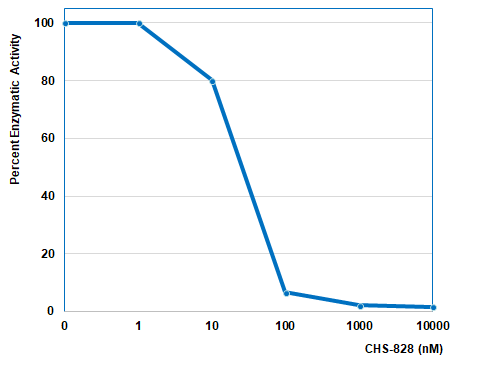Nampt (mouse) (rec.) (enzymatically active)
Product Code:
AG-40B-0179
AG-40B-0179
Host Type:
Human
Human
Regulatory Status:
RUO
RUO
Target Species:
Mouse
Mouse
Shipping:
Dry Ice
Dry Ice
Storage:
-80°C
-80°C
No additional charges, what you see is what you pay! *
| Code | Size | Price |
|---|
| AG-40B-0179-C050 | 50 ug | £357.00 |
Quantity:
Prices exclude any Taxes / VAT
Stay in control of your spending. These prices have no additional charges, not even shipping!
* Rare exceptions are clearly labelled (only 0.14% of items!).
* Rare exceptions are clearly labelled (only 0.14% of items!).
Multibuy discounts available! Contact us to find what you can save.
This product comes from: Switzerland.
Typical lead time: 7-10 working days.
Contact us for more accurate information.
Typical lead time: 7-10 working days.
Contact us for more accurate information.
- Further Information
- Documents
- Show All
Further Information
Alternate Names/Synonyms:
Visfatin; PBEF; Pre-B Cell Colony Enhancing Factor 1; PBEF1; Nicotinamide Phosphoribosyltransferase; NAmPRTase
Biological Activity:
1µg to 5µg of Nampt (mouse) (rec.) (enzymatically active) show activity in a colorimetric Nampt assay.
Concentration:
Lot dependent.
EClass:
32160000
Endotoxin:
<0.01EU/µg purified protein (LAL test).
Form (Short):
liquid
Formulation:
Liquid. Contains PBS.
Handling Advice:
After opening, prepare aliquots and store at -80°C.Avoid freeze/thaw cycles.
Long Description:
Protein. Mouse Nampt (visfatin/PBEF) (aa 1-491) is fused at the N-terminus to a FLAG®-tag. Source: HEK 293 cells. Endotoxin content: <0.01EU/µg purified protein (LAL test; Lonza). Liquid. Contains PBS. Purity: >90% (SDS-PAGE). Nicotinamide phosphoribosyltransferase (NAmPRTase or Nampt) also known as pre-B cell colony-enhancing factor 1 (PBEF1) or visfatin is the rate-limiting enzyme in the nicotinamide adenine dinucleotide (NAD+) salvage pathway that converts nicotinamide to nicotinamide mononucleotide in mammals to enable NAD+ biosynthesis. In addition it has been shown to be an adipokine that is localized in the bloodstream and has various functions, including the promotion of vascular smooth muscle cell maturation and inhibition of neutrophil apoptosis. It activates insulin receptor and has insulin-mimetic effects, lowering blood glucose and improving insulin sensitivity. The protein is highly expressed in visceral fat and serum levels of the protein correlate with obesity. The recombinant Nampt (mouse) (rec.) (enzymatically active) (Prod. No. AG-40B-0179) shows activity to convert nicotinamide + phosphoribosyltransferase (PRPP) to nicotinamide mononucleotide (NMN). It migrates as a homodimer on a size exclusion chromatography (SEC) column.
Molecular Weight:
~55kDa (SDS-PAGE); ~100-110 kDa (Dimer) (SEC)
NCBI, Uniprot Number:
Q99KQ4
Package Type:
Plastic Vial
Product Description:
Nicotinamide phosphoribosyltransferase (NAmPRTase or Nampt) also known as pre-B cell colony-enhancing factor 1 (PBEF1) or visfatin is the rate-limiting enzyme in the nicotinamide adenine dinucleotide (NAD+) salvage pathway that converts nicotinamide to nicotinamide mononucleotide in mammals to enable NAD+ biosynthesis. In addition it has been shown to be an adipokine that is localized in the bloodstream and has various functions, including the promotion of vascular smooth muscle cell maturation and inhibition of neutrophil apoptosis. It activates insulin receptor and has insulin-mimetic effects, lowering blood glucose and improving insulin sensitivity. The protein is highly expressed in visceral fat and serum levels of the protein correlate with obesity. The recombinant Nampt (mouse) (rec.) (enzymatically active) (Prod. No. AG-40B-0179) shows activity to convert nicotinamide + phosphoribosyltransferase (PRPP) to nicotinamide mononucleotide (NMN). It migrates as a homodimer on a size exclusion chromatography (SEC) column.
Purity:
>90% (SDS-PAGE)
Sequence:
Mouse Nampt (visfatin/PBEF) (aa 1-491) is fused at the N-terminus to a FLAG®-tag.
Source / Host:
HEK 293 cells
TAGs:
FLAG
Transportation:
Non-hazardous
UNSPSC Category:
Other Proteins
UNSPSC Number:
12352202
Use & Stability:
Stable for at least 6 months after receipt when stored at -80°C. Working aliquots are stable for up to 3 months when stored at -20°C.



